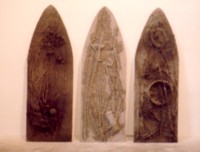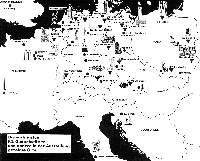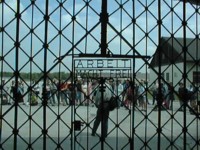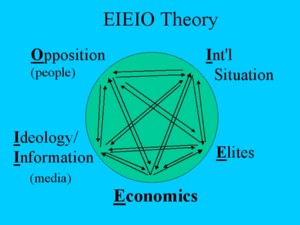Hist. 2c: World History,
1700-present
Prof. Marcuse, UCSB, Spring 2003
Outline for today
- Syllabus
- A personal story: Why I studied
history
- Dachau and EIEIO:
A model of causality in history
My
goals:
- to convey to you some of the diversity
of human history around the globe
- to practice examining sources
and figuring out what they mean
- to figure out why things are the
way they are, and
- to figure out how we might go
about changing them
- Your goals?
- …
 What
I selected to teach about
What
I selected to teach about
As you can see, the population of Asia and India is larger than that of Europe,
N & S America, Oceania and Africa. However, in this course I will not be
talking about them in proportion to their human weight. I tend to spend proportionately
more time on European history, since that is my area of expertise. This emphasis
is also true of the textbook, which we selected for Hist 2B and 2C because it
has one of the most readable narratives we found.
 Requirements
Requirements
- Effort & attendance
- Discussion sections (wait list)
- Readings: textbook, autobiography,
reader
- Outside events
- Writing assignments: book essay,
event essay
- Exams: midterm and final
 Why
I studied history
Why
I studied history
- I didn't. (no history courses
in college)
- I was curious. (What did Dachau
look like?)
- I had a question. (How did it
get to look that way? The question was triggered by some artworks that a friend
in LA had made: reliefs combining Christian martyrs' attributes and symbols
of the Nazi concentration camps.)
- I tried to answer it. (The result
was a photographic exhibition that toured Germany for several years after
1985. The map collage at right shows monuments and memorials that were shown
and interpreted in the exhibition.
 Tourists
in Dachau, Germany
Tourists
in Dachau, Germany
Photo from cover of Professor's book about post-1945 history of Dachau (Legacies
of Dachau: The Uses and Abuses of a Concentration Camp, 1933-2001): tourist
group seen through concentration camp gate. Why do we want to remember history?
How do we remember it? What aspects do we remember?
I call my approach to history "reception history": how people receive,
take in history.
 Causes
in History
Causes
in History
- Question: What factors
played a role in causing the Nazi Holocaust? In allowing it
to happen?
In general, what things play a role in allowing and making historical
events happen?
- Answer:
5 broad categories, interconnected:
- Economic factors (Marxism:
these underlie all others)
- International factors
(diplomacy, intervention)
- Elites (behavior of
groups w/ special access to power)
- Ideology/Information/Media:
perception of the world
- "Opposition": peOple,
human agents
page created by H. Marcuse, 4/5/03
back to Hist 2c homepage
 What
I selected to teach about
What
I selected to teach about  What
I selected to teach about
What
I selected to teach about  Requirements
Requirements
 Why
I studied history
Why
I studied history  Tourists
in Dachau, Germany
Tourists
in Dachau, Germany  Causes
in History
Causes
in History